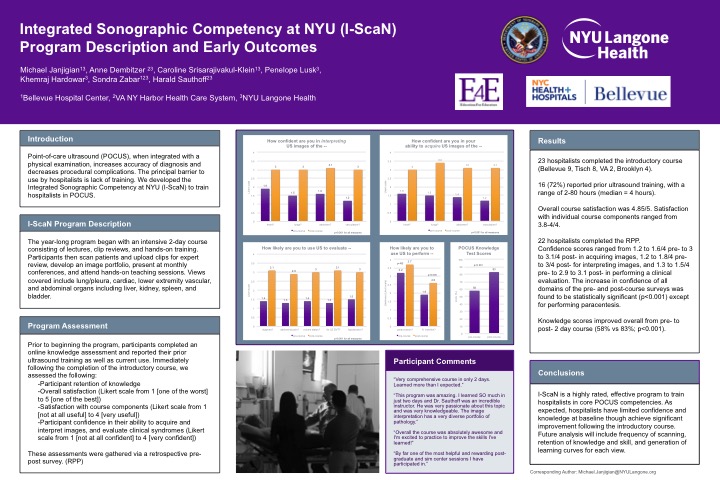Background: Point-of-care ultrasound (POCUS), when integrated with a physical examination, increases accuracy of diagnosis and decreases procedural complications. The principal barrier to use by hospitalists is lack of training. We developed the Integrated Sonographic Competency at NYU (I-ScaN) to train hospitalists in POCUS.
Methods: The year-long program began with an intensive 2-day course consisting of lectures, clip reviews, and hands-on training. Participants then scan patients and upload clips for expert review, develop an image portfolio, present at monthly conferences, and attend hands-on teaching sessions. Views covered include lung/pleura, cardiac, lower extremity vascular, and abdominal organs including liver, kidney, spleen, and bladder.
Prior to beginning the program, participants completed an online knowledge assessment and reported their prior ultrasound training as well as current use. Immediately following the completion of the introductory course, we assessed the following:
Participant retention of knowledge
Overall satisfaction (Likert scale from 1 [one of the worst] to 5 [one of the best])
Satisfaction with course components (Likert scale from 1 [not at all useful] to 4 [very useful])
Participant confidence in their ability to acquire and interpret images, and evaluate clinical syndromes (Likert scale from 1 [not at all confident] to 4 [very confident]
These assessments were gathered via a retrospective pre-post survey (RPP).
Results: 23 hospitalists completed the introductory course (Bellevue 9, Tisch 8, VA 2, Brooklyn
4).
16 (72%) reported prior ultrasound training, with a range of 2-80 hours (median = 4 hours).
Overall course satisfaction was 4.85/5. Satisfaction with individual course components ranged from 3.8-4/4.
22 hospitalists completed the RPP.
Confidence scores ranged from 1.2 to 1.6/4 pre- to 3 to 3.1/4 post- in acquiring images, 1.2 to 1.8/4 pre- to 3/4 post- for interpreting images, and 1.3 to 1.5/4 pre- to 2.9 to 3.1 post- in performing a clinical evaluation. The increase in confidence of all domains of the pre- and post-course surveys was found to be statistically significant (p<0.001) except for performing paracentesis.
Knowledge scores improved overall from pre- to post- 2 day course (58% vs 83%; p<0.001).
Participant Comments:
“Very comprehensive course in only 2 days. Learned more than I expected.“
“This program was amazing. I learned SO much in just two days and Dr. Sauthoff was an incredible instructor. He was very passionate about this topic and was very knowledgeable. The image interpretation has a very diverse portfolio of pathology.”
“Overall the course was absolutely awesome and I’m excited to practice to improve the skills I’ve learned!”
“By far one of the most helpful and rewarding post-graduate and sim center sessions I have participated in.”
Conclusions: I-ScaN is a highly rated, effective program to train hospitalists in core POCUS competencies. As expected, hospitalists have limited confidence and knowledge at baseline though achieve significant improvement following the introductory course. Future analysis will include frequency of scanning, retention of knowledge and skill, and generation of learning curves for each view.

